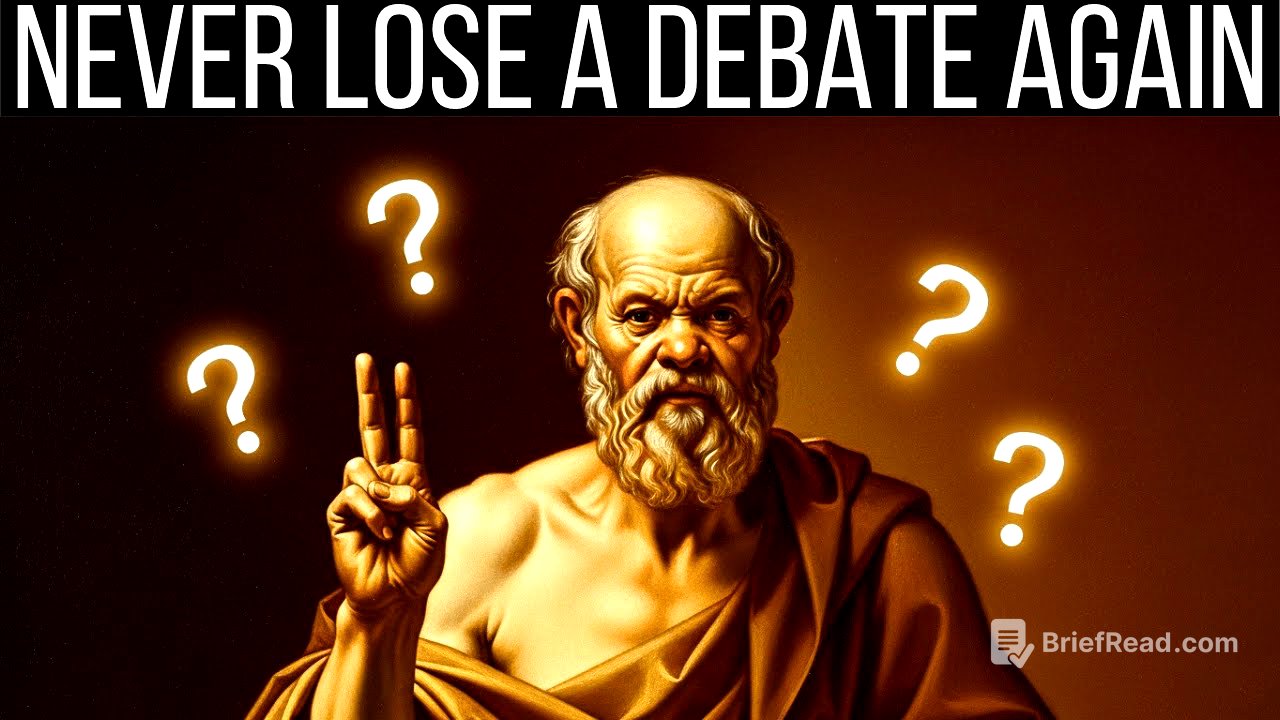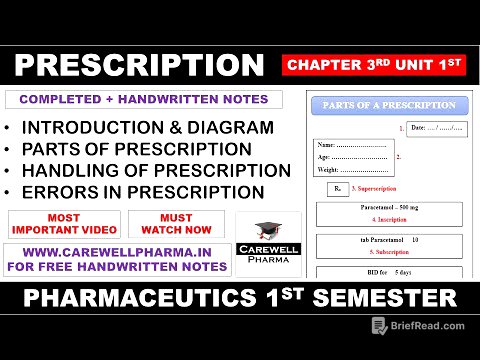TLDR;
This video explains the Socratic method, a powerful tool for intellectual self-defense and effective communication. It details five key questions used by Socrates to dismantle arguments and expose weaknesses in thinking. The video emphasizes the importance of using these questions to promote reflection, control conversations, and uncover truth, rather than to simply win debates. It also covers ethical considerations and practical applications of the Socratic method in various modern contexts.
- The Socratic method uses questions to dismantle arguments and expose weaknesses in thinking.
- The five key questions are: "How do you know that's true?", "What assumptions are you making?", "What evidence would change your mind?", "What would someone who disagrees with you say?", and "What are the logical implications of your position?".
- The method promotes reflection, controls conversations, and uncovers truth.
- Ethical considerations include intellectual humility, genuine curiosity, and a collaborative spirit.
- Practical applications include business, sales, parenting, relationships, and online discussions.
Introduction: The Power of Socratic Questioning [0:00]
Socrates's method involved dismantling arguments through targeted questioning rather than defending a position. This approach allowed him to expose weaknesses in others' arguments without appearing aggressive. Mastering this method can shift power dynamics in various settings, enabling one to control conversations and expose flawed reasoning. The core of this method lies in understanding why questions are more effective than direct arguments.
Why Questions Beat Arguments [1:16]
Arguments create resistance by exposing a position to attack, while questions foster reflection and self-examination. Asking questions allows one to control the conversation's direction and focus, placing the respondent in a position of answering to the questioner's agenda. Questions are immune to criticism because they seek truth rather than assert it, making this method an ultimate form of intellectual self-defense.
Question 1: The Foundation Destroyer [2:56]
The first question, "How do you know that's true?", challenges the basis of a person's beliefs, compelling them to examine the validity and source of their information. Most people hold unexamined opinions from various sources and struggle to provide adequate justification when questioned. To deploy this question, one should wait for a confident assertion and then inquire about its basis, allowing the person to realize the lack of solid evidence. An advanced variation is asking, "What would have to be true for that statement to be false?"
Question 2: The Assumption Excavator [4:44]
The second question, "What assumptions are you making?", aims to uncover the hidden, unstated beliefs that underpin an argument. Exposing these assumptions makes them easier to scrutinize. Most individuals are unaware of their assumptions, and articulating them transforms these assumptions into testable hypotheses. This question is best used following absolute statements or generalizations, prompting the person to identify the underlying beliefs necessary for their argument to hold. Variations include asking what is being taken for granted or what someone from a different background might assume.
Question 3: The Evidence Interrogator [6:23]
The third question, "What evidence would change your mind?", serves as an intellectual honesty test, distinguishing between genuine reasoning and mere rationalization. If a person cannot identify any evidence that would alter their stance, they are likely engaged in close-minded belief protection rather than open-minded thinking. This question forces a person to consider the possibility of being wrong. If they admit that nothing would change their mind, they reveal their irrationality; if they identify potential evidence, a framework for discussion is created. A follow-up question is to ask whether they have sought out this evidence.
Question 4: The Perspective Shifter [7:58]
The fourth question, "What would someone who disagrees with you say?", assesses intellectual empathy and the capacity to understand opposing viewpoints. Many people struggle to accurately represent views they oppose, highlighting the limitations of their thinking. True understanding necessitates seeing issues from multiple angles. If someone cannot articulate why intelligent individuals might hold differing views, they lack a comprehensive grasp of their own position. Often, people create weak "straw man" arguments when attempting to explain opposing views, revealing a lack of serious engagement with those ideas.
Question 5: The Consequence Calculator [9:38]
The fifth question, "What are the logical implications of your position?", compels individuals to trace their beliefs to their logical conclusions. Positions that seem reasonable in isolation can often become problematic when their implications are fully explored. People frequently hold beliefs without considering where those beliefs might lead. By examining the full implications, they may realize inconsistencies or unintended consequences that undermine their original stance. This involves applying their principle universally and considering the outcomes if everyone adopted their position.
The Complete Socratic Sequence [11:16]
To systematically dismantle a weak argument, use the five questions in sequence: first, allow the person to fully state their position; second, ask how they know it's true; third, inquire about their assumptions; fourth, ask what evidence would change their mind; and fifth, ask what someone who disagrees would say, and finally, ask what the logical implications are. This sequence encourages the person to question their own position without direct opposition.
Advanced Socratic Tactics [13:08]
Several advanced tactics can enhance the effectiveness of Socratic questioning. The strategic pause involves remaining silent after asking a question to encourage deeper thought. The clarification loop requires asking for clarification on vague answers until a precise meaning is established. The example trap involves requesting specific examples to test the validity of general statements. Finally, the consistency check compares the current position with earlier statements to expose inconsistencies.
Defending Against Socratic Questions [14:04]
To defend against the Socratic method, recognize the pattern of questioning without the questioner taking a position. Turn the method around by asking them to state their own beliefs. Demand good faith by asking if the questions are for understanding or attack. Set boundaries by stating a willingness to examine your beliefs if they also share their position.
When Not to Use Socratic Questions [14:50]
Avoid using Socratic questions in emotionally charged situations where logical questioning may seem dismissive. Also, avoid using it with authority figures where it might be perceived as a challenge. In time-sensitive situations, action may be more critical than thorough analysis. Finally, be cautious when using it with close relationships, as constant questioning can strain those bonds.
Modern Applications [15:30]
The Socratic method has numerous modern applications. In business, it can guide teams to solutions by asking questions rather than giving answers. In sales, it helps prospects identify their needs. In parenting, it encourages teenagers to examine their reasoning. In relationships, it fosters understanding. Online, it is effective in comment sections and social media debates.
The Ethical Dimension [16:18]
The Socratic method carries ethical responsibilities. Socratic virtues include intellectual humility, genuine curiosity, and a collaborative spirit. Socratic sins include intellectual bullying, bad faith questioning, endless skepticism, and developing a superiority complex. It's important to apply these questions to one's own beliefs first.
The Transformation [17:21]
Mastering these questions leads to a shift in how disagreements are approached, focusing on finding truth rather than being right. It reduces defensiveness and promotes investigation over argument. People will seek your help in thinking through complex problems. Questions become more valuable than answers because they create more thinking and help people more effectively.
The Socratic Legacy [18:04]
Socrates' method remains relevant because the right questions are more powerful than any answers. In an age of information overload and confident ignorance, the Socratic method is essential for improving the quality of thinking in every conversation. The ultimate power of the Socratic method lies in liberating oneself from unexamined beliefs, using the five questions to construct better thinking.








![[Digimon Podcast] LiT Episode 112 - This Child is Dead](https://wm-img.halpindev.com/p-briefread_c-10_b-10/urlb/aHR0cDovL2ltZy55b3V0dWJlLmNvbS92aS9jVFpvWHloeTN6Yy9ocWRlZmF1bHQuanBn.jpg)
